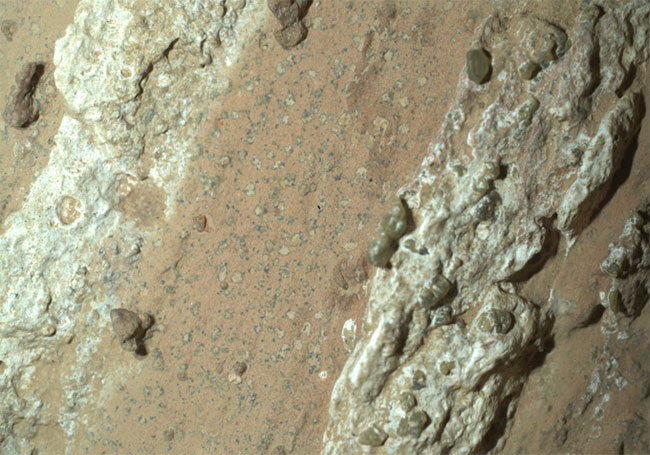Mars rock discovered may contain fossilized bacteria
The rock sample collected by NASA's robot has 3 points that attract scientists, showing that life could have existed on Mars billions of years ago .
NASA's Mars rover Perseverance has found an arrow-shaped rock that may contain fossilized microorganisms from billions of years ago when the planet was still full of water, AFP reported on July 26. This could be the robot's most surprising discovery to date, showing signs of ancient life on the red planet.

NASA's Perseverance rover takes a photo of the Cheyava Falls rock on Mars in July 2024. (Image: NASA/JPL-Caltech/MSSS).
Perseverance drilled into the mysterious rock, dubbed "Cheyava Falls," to collect core samples as it passed through the ancient river valley of Neretva Vallis on July 21. The samples were carefully placed under the robot's belly, awaiting a return trip to Earth for more comprehensive analysis.
"Cheyava Falls is the most puzzling, complex, and possibly the most important rock Perseverance has ever studied. We've lasered and X-rayed it, photographed it day and night from every conceivable angle ," said Caltech scientist Ken Farley. There are three features of the rock that particularly intrigued scientists.
- First are the white calcium sulfate veins running along the length of the rock, a sign that water once flowed through it.
- Second, between these ridges is a red region filled with organic compounds detected by the robot's SHERLOC instrument.
- Finally , tiny, black-rimmed ivory-white spots that resemble the spots on a leopard's fur contain chemicals that suggest an energy source for ancient microorganisms, according to PIXL scans.
'On Earth, these types of rock features are often associated with fossil evidence of subsurface microorganisms,' explains astrobiologist David Flannery at Queensland University of Technology in Australia, a member of the Perseverance science team.
But the mission to confirm ancient life on Mars is far from over. The real test will come when Perseverance's precious rock samples are brought back to Earth as part of a NASA-European Space Agency (ESA) Mars sample return program, which is expected to begin in the 2030s.
While there are other, non-microbial explanations for the new discovery, it's still possible that Perseverance's sample actually contained fossilized microorganisms, helping the rover make history by finding the first evidence of extraterrestrial life.
- Discovered 'coffin' on Mars
- NASA ships find gray stones on the surface of Mars
- Fans are excited to discover the ancient gods on Mars
- Discover the image of a monkey sitting on Mars?
- Mars once existed drinkable water
- Discovered the rock resembling President Obama on Mars
- Discovering rocks on Mars has the same composition in Earth
- Appeared Stonehenge relics populations on Mars?
- 'Message' from the fourth meteorite on Mars
- Crocodiles have migrated to live on Mars?
- There is evidence of life on Mars 4 billion years ago
- Did the ocean on Mars get into the rock?
 Announced 3 houses on the Moon and Mars
Announced 3 houses on the Moon and Mars Science proves: Mars also knows 'deflated'
Science proves: Mars also knows 'deflated' Elon Musk announced the price for a Mars trip was 11.6 billion VND, free of charge
Elon Musk announced the price for a Mars trip was 11.6 billion VND, free of charge NASA discovered strange 'gate' on Mars, is the hiding place found?
NASA discovered strange 'gate' on Mars, is the hiding place found?